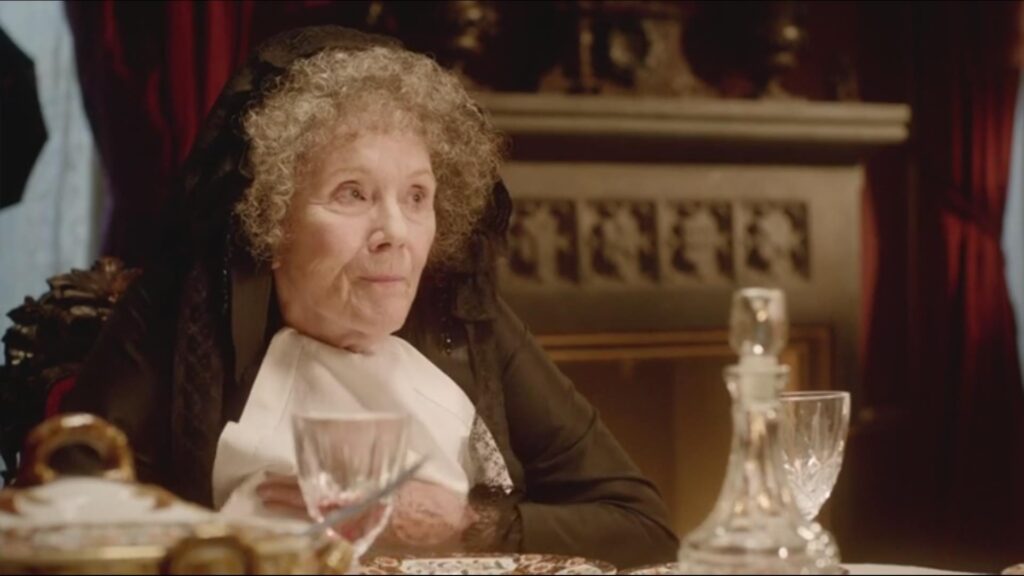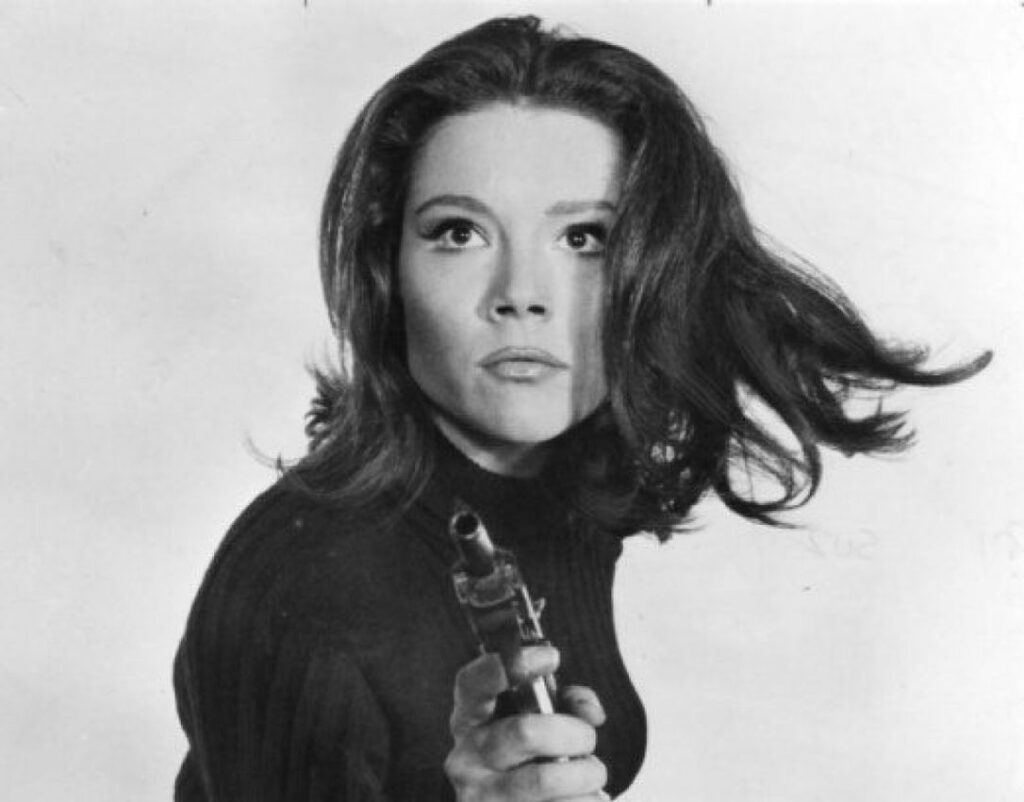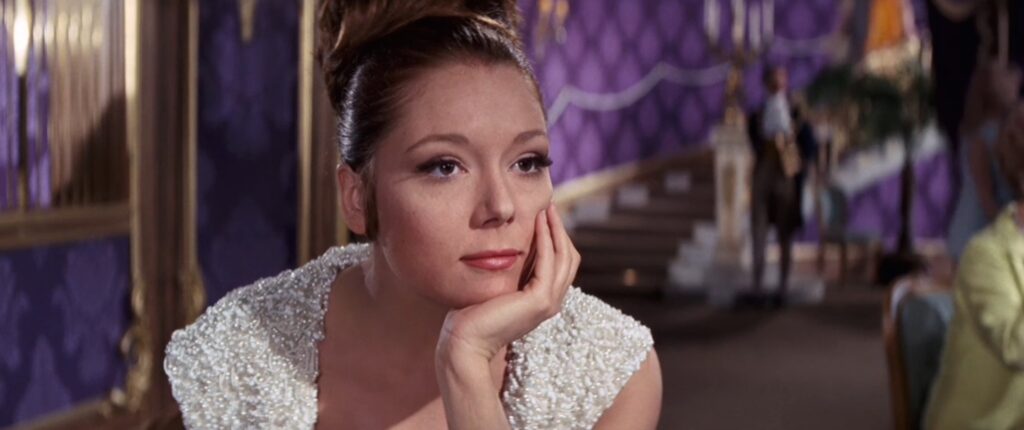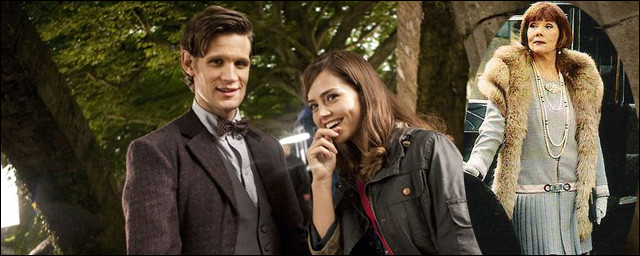Dame Dianna Rigg: 1938-2020

Dame Diana Rigg enjoyed a long and distinguished acting career on stage, in film and on television. The range of her roles was enormous, from serious drama to high camp.
She was the only Bond girl to get 007 to the altar. But for those of a certain generation, she will always be the desirable Emma Peel in The Avengers TV series.
Enid Diana Elizabeth Rigg was born near Doncaster on 20 July 1938. While still a toddler, she travelled to India, where her father worked as a railway engineer for the Maharaja of Bikaner.
By the time she returned to England after the war, she spoke Hindi as a second language. She was sent to a Yorkshire boarding school run by the Moravian church. “I felt like a fish out of water,” she said – although she later credited the experience with helping form her character.
On leaving school in 1955, she trained as an actress at the Royal Academy of Dramatic Art. She made her professional debut in a production of Bertolt Brecht’s The Caucasian Chalk Circle as part of the 1957 York Festival.
She joined the Royal Shakespeare Company, where she played a number of roles, receiving much praise for her portrayal of Cordelia in a touring production of King Lear.
In 1965, she screen-tested for the part of John Steed’s female companion in the TV series The Avengers after the departure of Honor Blackman to play Pussy Galore in Goldfinger.

In fact, the role had already been given to another actress, Elizabeth Shepherd. But Brian Clemens, the programme’s producer, was not happy with her performance.
“She’s not a bad actress,” he later recalled. “But she just didn’t have a sense of humour at all – that was essential in The Avengers. So we scrapped what we’d shot and got rid of her and then tested, and out of the tests came Diana Rigg, who was head and shoulders above everybody else.”
Her performance as the cat-suited Emma Peel brought her international fame. The surreal psychedelia of The Avengers made it as much a symbol of the Swinging 60s as the Mini and the Beatles.
Sexy, resourceful and self-assured – with a deadly knowledge of self-defence – Rigg’s character became an icon for the growing feminist movement. Her action-girl allure, coupled with her husky voice – the result of a 20-a-day cigarette habit – also brought her plenty of male admirers.
“We had no idea it would be defining,” she later said. “It was nose to the grindstone – working all hours that God gave.”
She also showed she was capable of taking on the establishment. During the first series, she discovered she was earning less than the cameramen and insisted on more money before making another episode.
But Rigg found the sudden fame as a TV star difficult to cope with. She recalled having to hide in a lavatory to avoid the attention of the crowds. It was partly her resentment at the invasion of her privacy that persuaded her that she would spend only two years with The Avengers.
She was also keen to keep her stage career alive. “Some weeks I’d spend four days on the set of The Avengers and then head up to Stratford to be Regan to Olivier’s Lear,” she said.

Like Blackman, Rigg moved from the Avengers to 007, starring in Her Majesty’s Secret Service opposite George Lazenby. Rigg became the only Bond girl to get the secret agent to the altar, although the marriage was abruptly cut short when her character was shot dead soon after the wedding.
Her relationship with Lazenby was difficult, although she denied deliberately eating garlic before their love scenes.
She starred as Vincent Price’s daughter in the camp horror film, Theatre of Blood, but soon returned to the stage – nominated for a Tony Award for her performance in Abelard and Heloise.
In New York, her portrayal of Heloise was criticised by acerbic US critic John Simon, who described her in a nude scene as “built like a brick basilica with insufficient flying buttresses”. She later admitted she never felt comfortable removing her clothes on stage.
“I come from Yorkshire, and no-one from Yorkshire takes their clothes off except on a Friday night,” she said. The episode led her to later publish a collection of scathing theatrical reviews titled No Turn Unstoned.
She took a number of leading roles with the National Theatre Company at the Old Vic and gained a second Tony nomination for her performance as Celimene in The Misanthrope.
In 1990, she won a Bafta for the role of an obsessive mother in the BBC drama Mother Love. Four years later she won a Tony for best actress in one of her most acclaimed roles, that of Medea.
In the same year, Rigg was created a Dame Commander of the Order of the British Empire.
She appeared in a number of TV costume dramas, winning an Emmy for her role as Mrs Danvers in a Carlton TV production of Daphne du Maurier’s Rebecca.
Her work in the theatre continued, including well-received performances in The Cherry Orchard, Pygmalion and Tennessee Williams’ Suddenly Last Summer.

In 2013, she appeared in a Doctor Who episode, The Crimson Horror, which was specially written for her by Mark Gatiss.
Her role as the evil Mrs Gillyflower was played alongside her daughter, Rachael Stirling. She was also required to use her native Yorkshire accent.
In her 70s, Dame Diana joined a long list of distinguished British actors who appeared in the HBO fantasy epic Game of Thrones, gaining an Emmy nomination. And she continued working until shortly before her death, appearing in the new remake of All Creatures Great And Small.
She was married twice, first to Israeli artist Menachem Gueffen, from 1973 to 1976, and then to Archie Stirling. The couple divorced in 1990 after Stirling’s affair with actress Joely Richardson.
In 2017, the 20-a-day smoker found herself seriously ill and undergoing a heart operation. During surgery, Rigg’s heart stopped and her life hung by a thread. “The good Lord must have said, ‘Send the old bag down again’,” the devout Christian later told a journalist. “I’m not having her yet.”
Although it was the role of Peel that brought her to public attention, Dame Diana was successful in casting off the character and carving out a distinguished career as a classical actress.
She never felt the need to return to the cat suit, steadfastly refusing to sign Avengers photographs that continued to be sent to her. Rigg excelled at playing sharp-witted female characters who carried steel fists in velvet gloves.